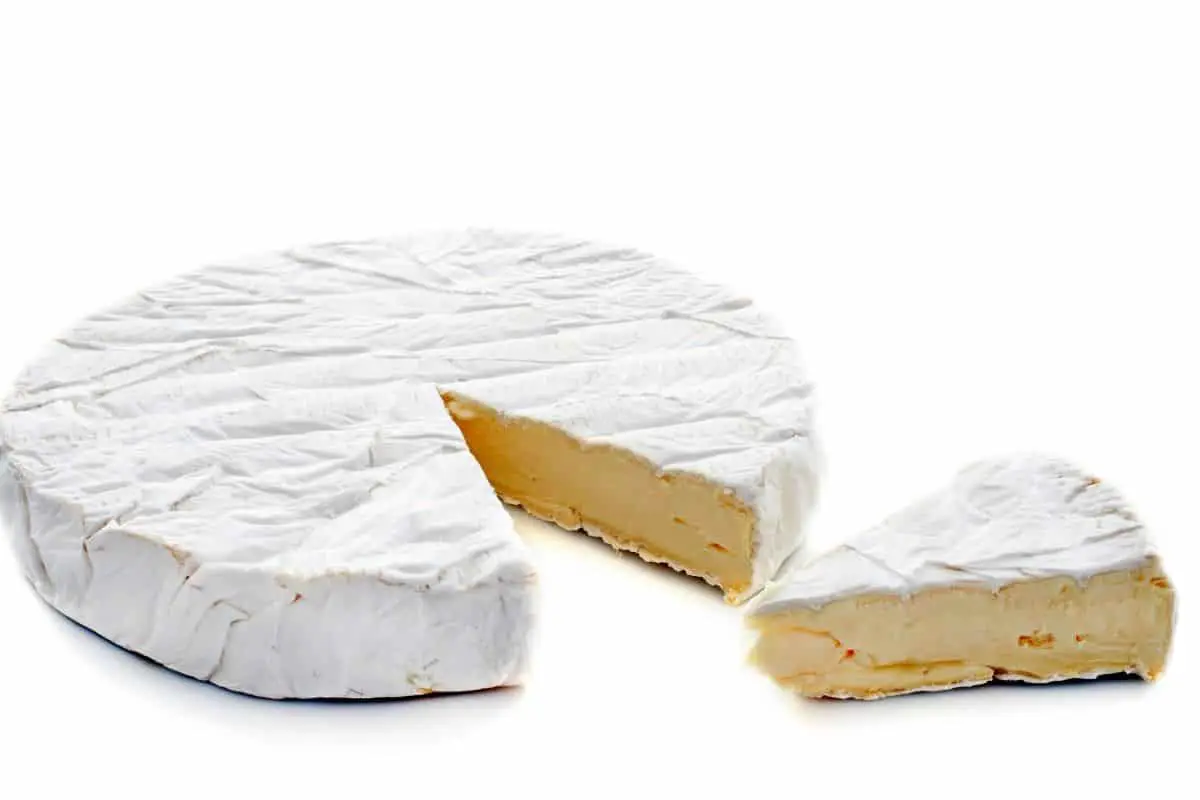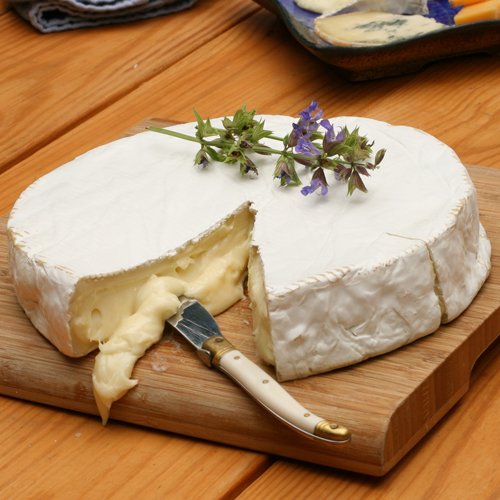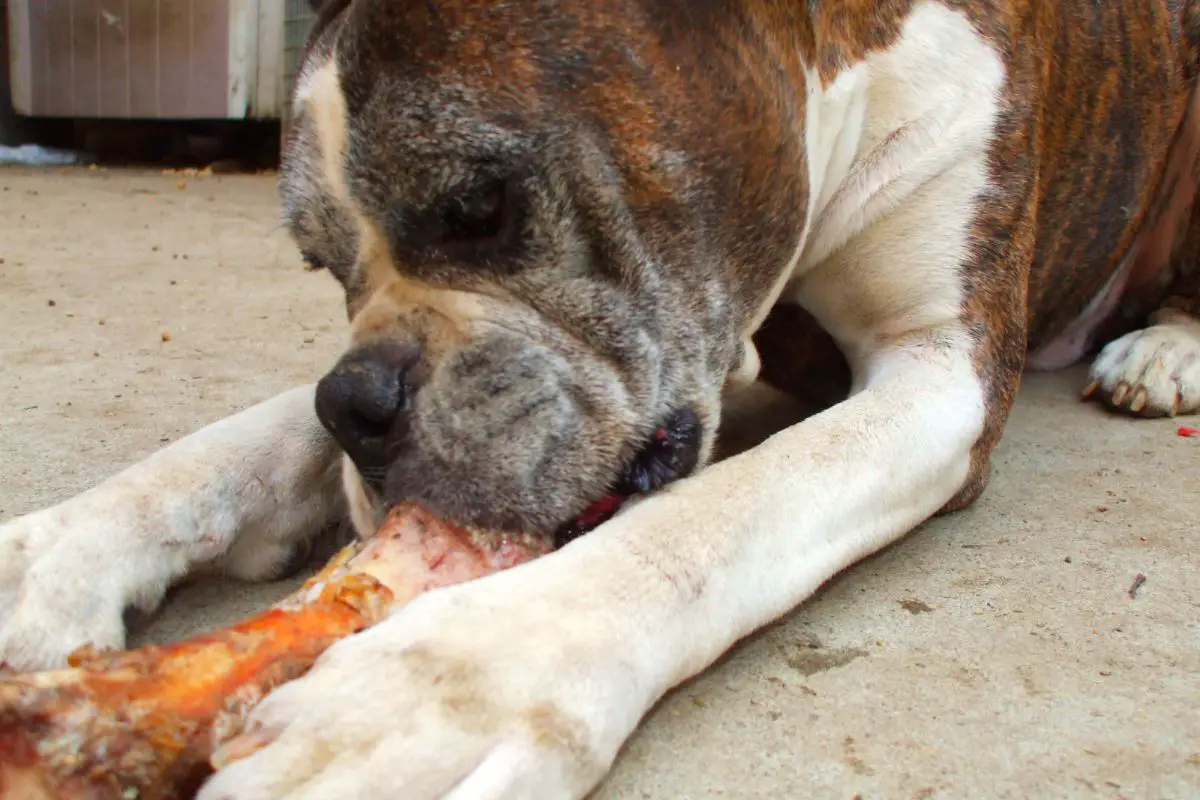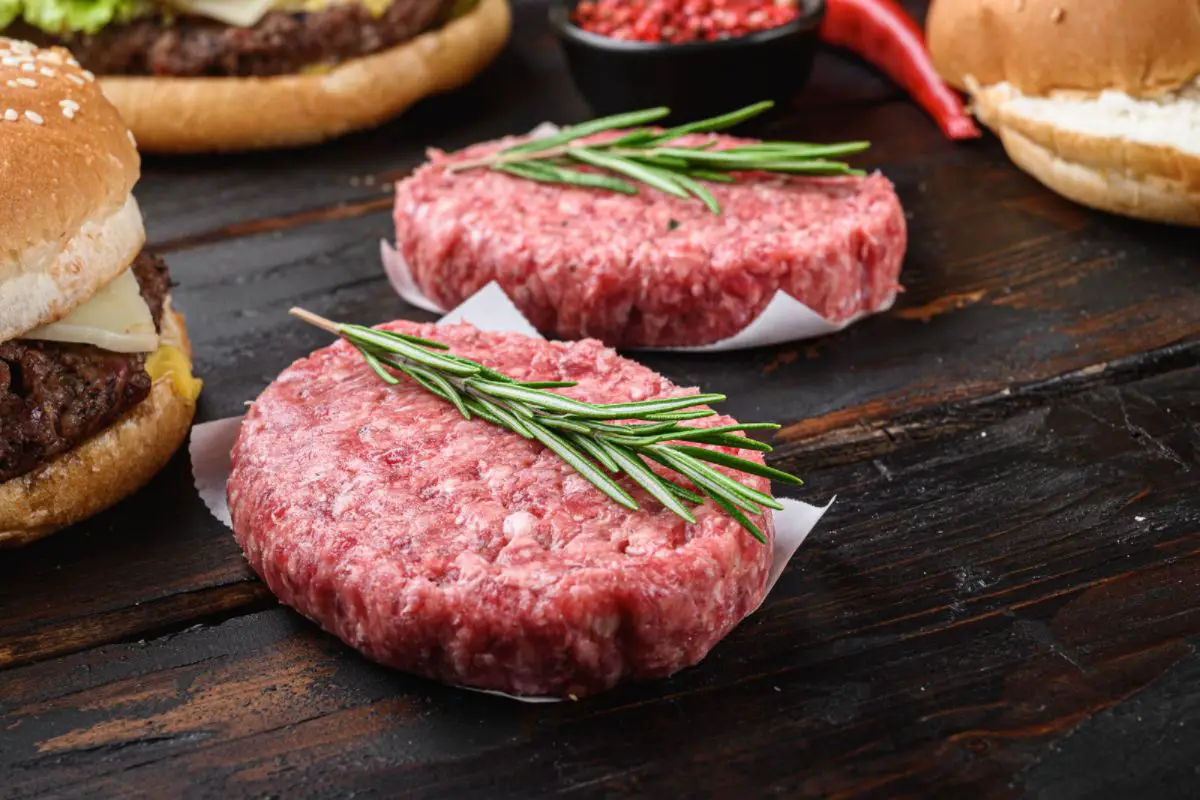This post contains affiliate links.
Most dogs love cheese, as it is full of the protein and fat that dogs crave for appetite satisfaction. French Brie is a soft creamy cheese with a mild flavor that your dog may not fully appreciate but will gladly eat. But can they eat it without getting sick?
Dogs can eat Brie according to AKC (American Kennel Club), so it’s okay to share a bit of Brie with your dog. Dogs can eat small amounts of all types of cheese except those with added ingredients like chives, garlic, onion, or herbs.
Your dog can eat Brie, but the amount should be tiny due to Brie’s high level of saturated fat. I went to the experts to find out where Brie and other high-fat foods fit into your dog’s diet.
Table of Contents
Brie Is a Small Treat, Not a Meal
If your dog helps himself to the whole wedge of Brie from your cheese board, it’ll probably not cause him any harm, but there might be intestinal repercussions from having that much cheese. However, even though eating Brie won’t kill your dog, it doesn’t mean the cheese is good for him.
Foods high in saturated fats can cause pancreatitis in dogs, and inflammation of the pancreas can be fatal. A steady stream of high-fat treats in addition to regular meals leads to obesity, and if you give him too much all the time, you will notice the weight gain more quickly.
Compared to snacks of pizza, cookies, and other high sugar and high carbohydrate foods, Brie is healthier, but such foods should never be used as a meal replacement.
Dogs need a balanced diet that includes the nutrient and caloric intake they need for good health.
There Are Better Cheese Choices Than Brie
Cheese as an occasional treat is okay for your dog, as trainers often use small bits of cheese as training rewards. However, Brie isn’t the best cheese choice for your dog. Cottage cheese and Mozzarella are lower in saturated fats and sodium, and goat cheese is also a better choice than Brie.
Your dog will be just as happy with the substitute cheese choices.
Most dogs who have tasted cheese are quick to store that bit of joy in their memory. Open the fridge door and grasp the cheese package, and your dog will appear from the far edges of your home before you can finish unwrapping.
Not All Dogs Should Eat Brie
Certain dogs shouldn’t eat Brie or any other cheese or dairy product. The fact is that some dogs, like people, are lactose intolerant.
Once a pup is weaned, his body makes less lactase, an enzyme needed to break down the lactose or sugar in dairy products. If too little lactase is produced, eating dairy products like cheese and even goat cheese will be difficult to digest.
You may see symptoms of lactose intolerance after feeding him dairy products like cheese and ice cream. Petmed identifies the symptoms of lactose intolerance which include:
- Diarrhea
- Abdominal distress
- Vomiting
Your Dog Will Gladly Accept the Brie If Allowed
If your dog does show indications of lactose intolerance, you will need to stop feeding him cheese and other dairy products. Of course, these same symptoms could have different causes, so if they persist after eliminating dairy from your dog’s diet, then see your Vet for a diagnosis and treatment.
You’ll want to be careful about leaving cheeses or milk products where your dog can get them. It’s rare that your dog will associate the cheese with sickness and will eat it any time there’s an opportunity.
Just because he never eats Brie or any other dairy product doesn’t mean that he is deprived, especially if you are feeding him a healthy, balanced diet. Good quality dog food has all the nutrients and calories that dogs need.
Share Other Snacks Instead of Brie With Your Dog
If you like sharing your snacks with your dog, try to stick to low-fat and lactose-free snacks. Falls Village Animal Hospital has some suggestions of other snacks that you can share with your dog that you probably have on hand in your kitchen:
- Many dogs like fruits and vegetables, as they’re high in fiber and nutrients with little to no fat. Small portions make great sacks.
- Bananas, apples, watermelon, and berries are good in moderation. Remove the seeds from the apple and watermelon, but don’t feed the watermelon rind to the dog, as he cannot digest seeds and rinds.
- Vegetables like broccoli, carrots, sweet potatoes, peas, and squash are nutritious. If you cook them first, they’ll be easier for your dog to digest.
- If you need to make a homemade meal for your dog, combine a couple of spoonfuls of some of the fruits and vegetables mentioned above, or add them to boneless cooked beef or chicken to equal the measured amount of food for your dog.
- Never season food that you feed to your dog.
My Dog Prefers Brie to Berries
It’s okay if your dog prefers Brie to berries because not all dogs will eat vegetables, especially if they’re raw. Your dog may look at fruit as if it’s something other than food.
My dog does not eat fruit or raw vegetables. To him, they’re like rocks.
My previous dog, however, loved raw vegetables, especially carrots and the fibrous ends of asparagus, and lived to be 17 years old. Coincidence? Probably, because he loved cheese more.
Dogs are carnivores, and they eat that for which their body calls. That’s why dog food companies create quality brand dog food with all the needed nutrients and antioxidants and is designed for taste and appetite satisfaction.
Brie Is Fine but Some Food Is Toxic for Dogs
Some foods, like Brie, are acceptable for your dog in small, infrequent bits. Others, like corn and grains, cause digestive upsets and allergic reactions. In fact, several foods in your kitchen might be dangerous to your dog’s health.
The Humane Society has compiled a list of household foods and additives that are never meant for dogs. These foods are acceptable for you but toxic to your pets.
Chocolate
Chocolate contains theobromine and caffeine, which are used in medicines to treat heart and vascular disease. We need to include coffee and teas because they contain caffeine as well. Chocolate and caffeine aren’t likely fatal, but they can make your dog very sick.
Xylitol
The FDA has determined that Xylitol is dangerous to dogs, as it is a sugar alcohol used in many products, including sugar-free products, vitamins, dental hygiene products. It was sugar-free gum that alerted the FDA to the danger, and they determined that xylitol can be fatal to dogs.
Alcoholic Beverages
Not only are alcoholic beverages poison to dogs, but it’s inhumane and therefore illegal. Keep in mind that other products contain alcohol, such as syrups, extracts, raw yeast dough, and more. So when you’re kicking back with a few drinks, be sure to keep them out of reach of your dog, as it could prove fatal.
Seasonings
Seasonings such as salt, garlic, onions can make dogs sick, so if you give them Brie or any other food, keep it free of seasonings and herbs. And, if you’re barbecuing or smoking any meats, and want to give some to your dog, try making a separate helping of meat that does not contain seasonings.
Leafs and Stems
- Tomatoes
- Rhubarb
- Potatoes
- Mushrooms
Seeds, Pits, and Nuts
- Apples
- Apricots
- Avocados
- Cherry
- Peach
- Mustard
- Walnuts
- Macadamia Nuts
The ASPCA Pet Insurance has posted a list of 15 garden flowers that are toxic for dogs, including what might be some of your favorites, like tulips and Iris.
There are a lot of ingestible products that are more dangerous to dogs than Brie.
Why Would We Give Our Dogs Brie?
We give our dogs so much more than Brie. They are family members in every way that matters, so we find joy in sharing with them. If we love Brie, then we want to share it with our best friend. And unlike your children who see the mold and run away, your dog is at least willing to try it.
We can indulge dogs because they don’t have to grow up to be responsible and self-sufficient. Yet they give us so much back in fun and devotion. No matter what we’re eating, our dog looks at us expectantly, and we don’t disappoint. They expect us to share.
Dogs Can Eat Brie but Should They?
Everybody in the family is sharing their favorite snack with the dog, but they believe they are the only one who is doing so.
The dog is scoring a chip here, a bite of pizza there, an empty ice cream bowl to lick, and a bit of Brie mixed with dog food. Then there’s the food left lying about in open backpacks, purses, and trash bins.
The result is a lot of fat, salt, and calories, leading to poor health and obesity. So should they eat brie as well? You may want to call your family together and come up with a plan about how much they give your dog snacks throughout the day. Brie might be okay, but it needs to be part of an overall plan.
What Should the Dog Eat Instead of Brie?
Maybe all the dog needs is commercially made dog food. It’s difficult, perhaps impossible, to tuck as many nutrients, antioxidants, and fiber into homemade food as the dog food manufacturers, but they can do it without excess fat and calories.
Quality dog food manufacturers hire scientists to create dog food based on the specific needs of the dog. Engineers and nutritionists develop the formula for packing all that goodness into tasty shelf-stable bite-sized food.
There Is No Brie in Leading Dog Food Brands
Dogs need meat, which is what they crave. Look for actual meat as the first ingredient on the dog food label, rather than filler ingredients, which should be just beef, lamb, or chicken. Adding fruits and vegetables to commercial dog foods does not make a significant nutritional impact.
Adding Omega 3 to dog food boosts the benefits of dog food, such as fish oil, which promotes heart health and reduces inflammation that causes pain.
Grains provide carbohydrates and fiber that are essential to canine health and energy, but some dogs are allergic to wheat or other grains. If that is the case with your dog, look for grain-free food.
Think of Brie as a Snickers Bar
How many Snicker bars should an adult consume daily? One a day over and above your required calories for good health adds 280 calories, which might not seem like a lot of calories. But over the year, it could add 30 lbs (13.61 kg) to your body weight.
If you think of that tidbit of Brie as a Snickers Bar, you’ll have a better perspective on the impact of treats on dogs’ health. The additional nutrients are added, but so is fat, leading to obesity and pancreatitis.
Since dogs get nutritional benefits from small portions of fresh fruits and vegetables, reach for those first. A small unseasoned morsel of meat would be the second choice.
Try mixing them in with your dogs’ regular food, so you don’t exceed the serving size.
One ounce (28.35 g) of Brie contains almost 1000 mg (0.04 oz) of sodium, half the daily intake recommended for adult humans. When you add Brie to your dog’s diet in the form of a treat, you are adding excess saturated fats.
The Best Use of Brie in a Dogs Diet
Here are the best uses of Brie in your dog’s diet:
- If your dog loves cheese and can digest it, there’s a place in his diet for Brie and other cheeses.
- If the only time your dog gets cheese is during training, he will take training very seriously. Keep a few tiny cubes in a baggie as the ultimate reward.
- Brie is perfect as a pill pod. Tuck the pill into the soft texture and pop it in the dog’s mouth. But you’ll want to watch him closely so that he doesn’t cleanly shoot the pill out the side of his mouth.
- Because Brie is soft, it’s easy to flavor the inside of a chew bone or Kong toy. Use it to encourage your dog to chew away his anxiety and excess energy.
Conclusion
Your dog can safely eat small portions of Brie if they’re not lactose intolerant. However, Brie is high in fats and sodium, so it should be a rare treat. Mozzarella or goat cheese is a wiser choice for your dog than Brie since they’re lower in fat.
Substituting fresh fruits and vegetables for Brie is a better choice. It is my opinion that no dog will be as strongly inclined to obey over carrot sticks as they will for a bit of Brie.
Related Articles
- Can Dogs Eat Chicken Nuggets? Yay or Nay?
- Can Dogs Eat Chicken Feet? (We Ask the Experts)
- Can Dogs Eat Cornbread? (We Find Out)
- Can Dogs Eat Fig Newtons? (We Find Out)
- Can Dogs Eat Hummus? Read This First!
Sources
- American Kennel Club: Can Dogs Eat Cheese?
- PetMD: Can Dogs Drink Milk?
- Falls Village Veterinary Hospital: 4 Household Foods Toxic to Dogs & Cats
- The Humane Society of the United States: Foods That Can Be Poisonous to Pets
- U.S. Food & Drug Administration: Paws Off Xylitol; It’s Dangerous for Dogs
- ASPCA Pet Health Insurance: 15 Plants Toxic to Dogs
Mrdogfood.com is a participant in the Amazon Services LLC Associates Program, an affiliate advertising program designed to provide a means for sites to earn advertising fees by advertising and linking to Amazon.com. We also participate in other affiliate programs which compensate us for referring traffic.






